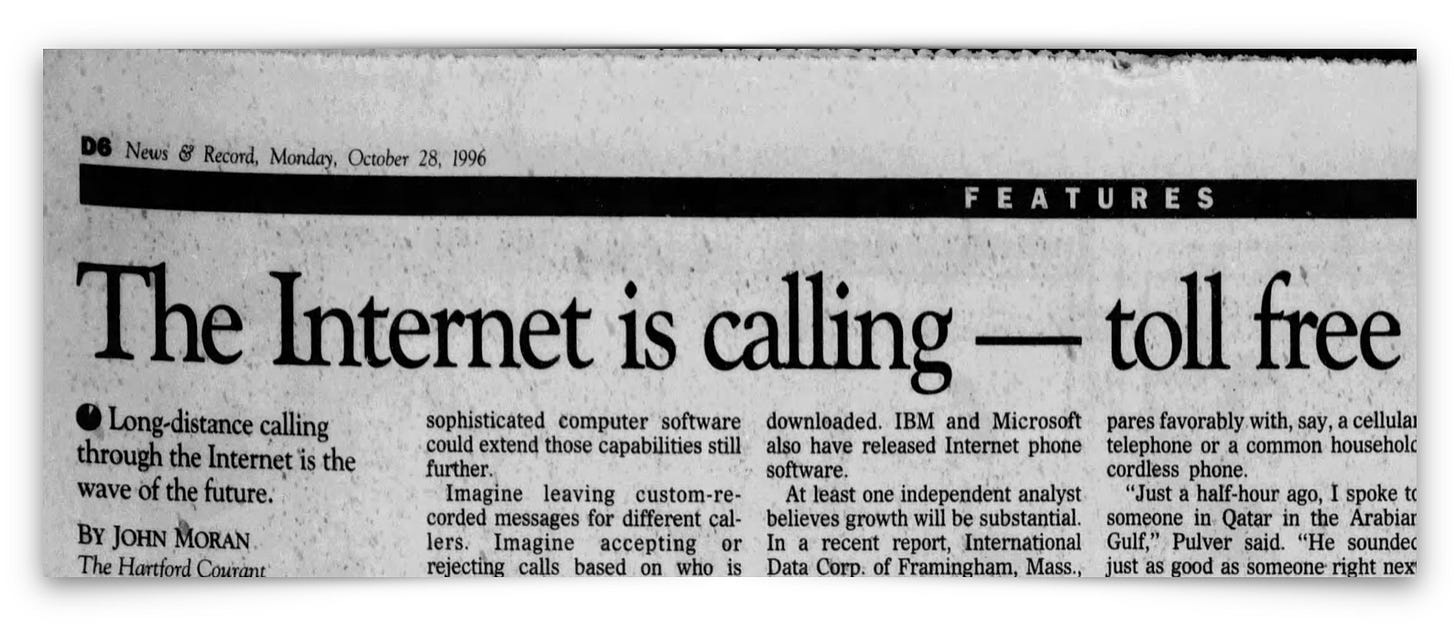The War on Internet Phone Calls
When long distance telephone companies tried to thwart online telephony
It used to cost money to call someone, and if that someone was in another country - you would pay a premium: in the mid-90s a prime time call to Paris from New York cost around $113 an hour (in 2025 dollars)
Then came the internet, paving the way for cheap and free calls to and from anywhere in the world… Guess what? Traditional long-distance telephone companies felt threatened.
In 1995, the internet had just 16 million users — but it was enough to make online phone calls useful. That year, startup VocalTec launched the first commercial internet phone software, amusingly named ‘i-phone’ (short for internet phone.) It quickly caught on with early web users, offering cheap long-distance calls - partly thanks to being exempt from FCC tariffs like local access charges. This prompted action from incumbents, who deemed it unfair.
In 1996 America’s Carriers Telecommunications Association (ACTA) - representing over 300 of them - filed a petition with the FCC that sought to ban the sale of long distance internet telephone services until they were regulated as ‘common carriers.’ The internet friendly Clinton Administration would oppose the petition - but it was up to the FCC to make a final ruling.
The Backlash
This is when the nerds stepped in: web browser pioneer Marc Andreessen told The San Francisco Examiner that his browser - Netscape - would build online calling into a future software update seemingly in protest (the feature never materialized.)
"Are we hurting their ability to charge you $10 for a long-distance phone call? Tough bananas" - Harvey Kaufman, vice president of NetSpeak Corp.
Jeff Pulver - an early i-phone user, who’d started a popular mailing list for online phone enthusiasts, would take it upon himself to lead the resistance. Prior to the FCC petition he launched the first online telephone network called ‘Free World Dialup’ (using the VocalTec system.) His mailing list turned into the ‘Voice on the Net coalition’: a group of internet phone enthusiasts and tech startups building out the technology.
This rag tag bunch of innovators would cobble together a lobbying effort to fight incumbents and allow this nascent technology to flourish…
In the following 8 years the VON coalition would fend off various attempts to rein in the technology, while the FCC would hold off ruling on the ACTA petition (VON is still operating today.)
1998 would see the FCC make a number of statements sympathetic to online phone services - meanwhile iphone.com would host an effort to petition lawmakers against online phone services. It isn’t clear if this was a real grassroots effort, or an astroturfed one by traditional phone providers…

In 2000 a bill passed the US house of representatives preventing phone companies charging by the minute for internet access - but it excluded internet telephony services. This prompted Jeff Pulver and his VON coalition to organize the ‘Internet Freedom Rally’ in Washington DC. It would feature the chairman of the FCC and classic rock performances.
In 2004 the FCC would finally rule on the ACTA petition after 8 years - but not before the Justice Department asked for a delay on a decisions until online phones call could be as easily wire tapped as regular calls. The FCC would make its final ruling dubbed the ‘Pulver Order’ allowing for cheap and free online phone calls to anywhere in the world we take for granted today.
This is a good example of how incumbents will try to use old rules to thwart competition enabled by new technologies - had the long distance telecoms companies succeeded, services like Facebook and Google might not be able to offer free voice and video calls globally.
Recommended reading/watching: Virginia Postrel explores this dynamic in her prescient 1998 book ‘The Future and its Enemies’, a thesis she talks discusses in this video featuring Virginia Postrel.










Interesting article. Excellent writing and super informative. Also loved the YouTube video at the end
cheguei aqui via manualdousuario.net/assunto/links-do-dia/